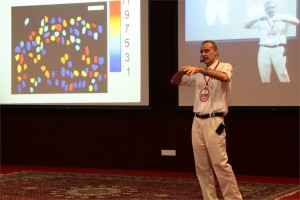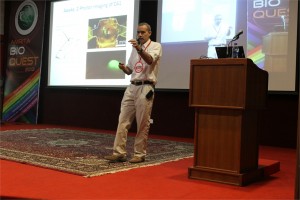 Upinder S. Bhalla, Ph.D.
Upinder S. Bhalla, Ph.D.
Professor & Dean, NCBS, Bengaluru, India
Watching the network change during the formation of associative memory
The process of learning is measured through behavioural changes, but it is of enormous interest to understand its cellular and network basis. We used 2-photon imaging of hippocampal CA1 pyramidal neuron activity in mice to monitor such changes during the acquisition of a trace conditioning task. One of the questions in such learning is how the network retains a trace of a brief conditioned stimulus (a sound), until the arrival of a delayed unconditioned stimulus (a puff of air to the eye). During learning, the mice learn to blink when the tone is presented, well before the arrival of the air puff.
The mice learnt this task in 20-50 trials. We observed that in this time-frame the cells in the network changed the time of their peak activity, such that their firing times tiled the interval between sound and air puff. Thus the cells seem to form a relay of activity. We also observed an evolution in functional connectivity in the network, as measured by groupings of correlated cells. These groupings were stable till the learning protocol commenced, and then changed. Thus we have been able to observe two aspects of network learning: changes in activity (relay firing), and changes in connectivity (correlation groups).
 Bodo Eickhoff, Ph.D.
Bodo Eickhoff, Ph.D.
Senior Vice-President, Head of Sales and Marketing for Roche Applied Science, Germany
New paths for treatment of complex diseases: target combinatorial drug therapy
Several types of diseases show a complex pathogenesis and require targeted as well as combinatorial drug treatment. A classical example, Tuberculosis, was thought for decades to be managable by triple therapy, however now requiring new therapeutic approaches due to multi drug resistant strains. HIV and AIDS can only be kept under control by combinations of specific, virus-protein targeted drugs, requiring constant monitoring of resistance patterns and modulation of drug combinations during life-long therapy. As a third example, Cancer in all its different variations, requires detailled molecular understanding to enable targeted therapy. New technologies provide more and in depths molecular insights into pathomechanisms and resulting treatment options. However, is there an alternative way to approach complex diseases by holistic models? Can restoring of apoptosis-capabilities of transformed cells be an example of such an alternative path? How do we in future adress major unresolved topics like increasing drug resistance in bacterial infections, lack of anti-viral drugs, treatment of parasite diseases like Malaria, and newly emerging infectious diseases in research and fast translation of these results into diagnosis and treatment?


